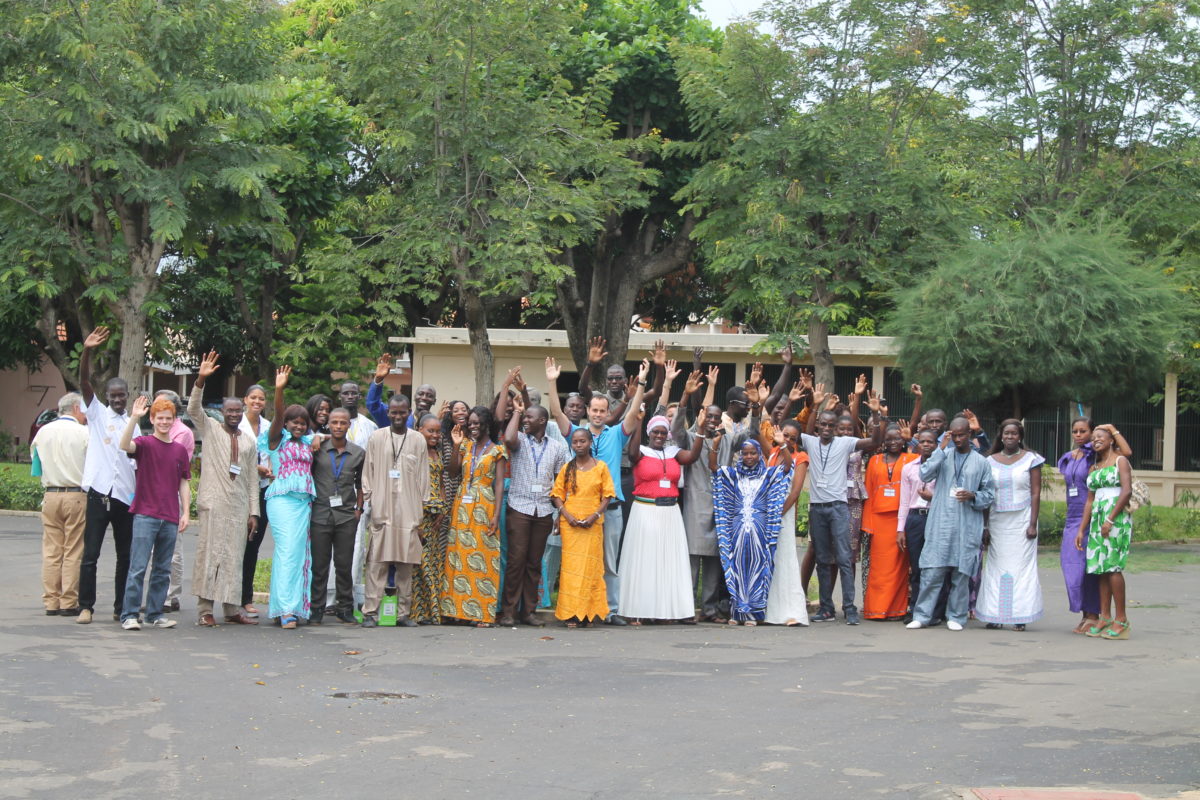
On the Front Lines: Studying Public Health in West Africa
Ryan Napper ’13 (at left, maroon shirt) waves with a group from the Institut Pasteur in Senegal.
As issues surrounding public health continue to dominate the media, one recent Allegheny graduate finds himself on the front lines.
Ryan Napper ’13, who double-majored in biology and global health development, has been in the West Africa country of Senegal since July 1 working with surveillance systems that gather epidemiological data. Napper is completing this work with the Institut Pasteur as part of his master’s in public health program at Columbia University: Mailman School of Public Health.
“I have seen firsthand the challenges that health workers and clinicians face when dealing with not only the day-to-day issues, but also major health events,” Napper says. “I’d say this experience has given me a pretty good view of the public health landscape and, to a degree, what a tremendous amount of work there is to be done.”
Napper took some time out of his busy schedule to share more about this experience and how he feels Allegheny helped to prepare him for it. Here is his story:
What kind of work are you doing in Senegal?
I’m getting experience working through global health projects. Specifically, I’m working to develop a syndromic surveillance system. Syndromic surveillance systems are a way to gather epidemiological data without having a finite diagnosis. Basically, clinicians enter patient symptoms into a Web database, the database classifies the patient as having a broad “syndrome,” and then that syndrome is tracked temporally and spatially. If things look abnormal (i.e., there are a lot of people presenting respiratory illness), then we can identify an outbreak as it is happening and react. This is especially crucial for rural areas, which don’t have the diagnostic equipment to identify outbreaks quickly.
Tell us how you ended up in Senegal after graduating from Allegheny.
I came to Senegal because I am getting my global certification for my master’s in public health. Students in my program do six-month study-away practicums in developing settings. A couple of students had worked here previously, so I expressed my interest in their work on infectious disease. A few months passed, and here I am.

Tell us about Senegal.
Senegal is pretty beautiful. I am in the capital city, Dakar, for most of my time, which is well developed and very nice. The coastal views and nature here are pretty spectacular as well. The people are friendly and incredibly welcoming. It has been a relatively easy transition, and the Senegalese have helped me quite a bit.
How did you become interested in public health?
Entirely by chance! I arrived at Allegheny with a pretty typical pre-med mentality. I thought I would major in biology, minor in psychology, take my prerequisites, and move onward to medical school. However, that changed during my sophomore year. I worked as a peer leader, and during orientation the global health program was mentioned for new students. I really hadn’t thought too much about international work but figured I would meet with the folks involved anyway. A couple meetings later, and through courses here and there, and I was moving toward a career in global health.
How did Allegheny prepare you for your experience in Senegal?
Allegheny taught me to think with different scopes and to always keep learning. The issues of public health are truly interdisciplinary. So to be effective, individuals need to hone in on a problem with great expertise and knowledge, but recognize the greater context.
For instance, if I were to evaluate a malaria vaccine effectively, I would have to know quite a bit about the biology of malaria and how this vaccine would interact with bodily systems. Though, even more so, I would need to recognize the greater context of the vaccine (the questions of how it will affect populations, will it even reach the appropriate populations, etc.). I think Allegheny taught me that process, thinking through a problem in one’s discipline, but always being cognizant of the greater context.
What have you learned from this experience so far?
As a global community, we really need to step up our efforts to make health care access and quality much better. Based on this experience, I think the word “endemic” will fall out of usage. We’re going to realize soon that populations are global – no longer isolated or fixed. Disease in one location easily affects us all. So we need to take better care of everyone.
What are your plans after Senegal?
I will be in Senegal until December. For the future, I’m going to take at least a year away from academia after my master’s in public health before pursuing a Ph.D. I would like to grow my experience by working internationally with non-governmental organizations or government organizations. My end-goal is to work to better translational research. I think there is a lot of great academic research happening that never has a tangible impact on populations. Bringing things from bench-top to bedside is pretty difficult. I would like to work in a position to facilitate that process, so that we’re all better equipped to deal with the health issues of the future.
Do you have any advice for Allegheny students?
Use your time at Allegheny to grow and explore more than locking yourself into any certain mind-set. Your experiences will shape you far more so than any preconceived trajectory. Keep an open mind, deviate freely, and focus on learning for yourself.